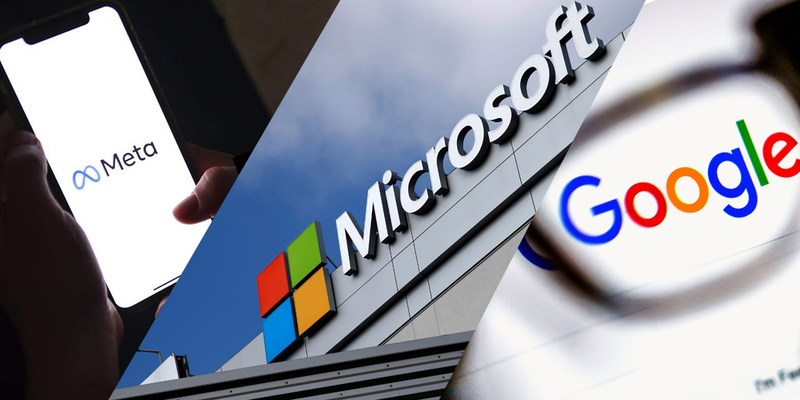Startup
Inside the green jobs market; ElasticRun’s growth plan for FY25

Hello,
Swiggy is said to be revising its IPO valuation.
It has supposedly slashed it to $11.3 billion, 25% below the initial goal of $15 billion, as market volatility and the lacklustre debut of Hyundai India weighed on sentiment.
According to Reuters, BlackRock and Canada Pension Plan Investment Board (CPPIB) will invest in the $1.4 billion IPO—the country’s second-biggest stock offering this year.
Just before Diwali, the Indian bourses entered the bear market amid weak global cues and rising volatility. The NSE Nifty 50 fell 2.7% last week and the BSE Sensex dropped 2.2%, logging losses for the fourth straight week.
In fact, October turned out to be the worst-ever month in terms of foreign fund outflows, with foreign investors pulling out a massive Rs 85,790 crore (around $10.2 billion) from equities due to the elevated pricing of domestic equities.
Investors would be treading tricky waters next few weeks, for sure.
ICYMI: The startup founders who took on Google!
Mother Nature is mysteriously beautiful! For instance, who knew the Dahlia flowers could help fight cancer?
Researchers at Oregon Health and Science University and the University of Portland have discovered a game-changing compound in these vibrant flowers that could help treat a host of illnesses—MS, cancer, Alzheimer’s disease, certain brain injuries and even cerebral palsy!
Always pleasant to the eyes, now Dahlias may well be soothing for the nerves!
In today’s newsletter, we will talk about
- Inside the green jobs market
- ElasticRun’s growth plan for FY25
Here’s your trivia for today: Which is the world’s longest cave system?
In-depth
Inside the green jobs market

Green jobs are roles that contribute to environmental sustainability by reducing emissions, conserving resources, and promoting eco-friendly practices. These jobs are ripe with career growth opportunities for experienced professionals, while they open up diverse pathways for fresh graduates, expanding options beyond traditional tech careers.
According to LinkedIn’s Global Climate Talent Stocktake 2024, the gap between the demand for green talent and its availability is rapidly widening. While demand increased by 11.6% from 2023 to 2024, the supply grew by only 5.6%. If these trends continue, there will be twice as many jobs requiring green skills as qualified candidates by 2050.
Green pastures:
- Most green jobs are found in renewable energy (solar, wind, hydro, biofuels, biogas), water management, e-waste management, green hydrogen, green building, and electric vehicles, among other sectors.
- This year, the Telangana Department of Information Technology, Electronics, and Communications launched the Green Skills Academy in Hyderabad in partnership with 1M1B (One Million for One Billion), a UN-accredited nonprofit.
- The rising demand for green jobs has led to greater interest in upskilling courses that combine traditional green skills with digital competencies like AI, data analytics, and project management.
Logistics
ElasticRun’s growth plan for FY25

Sandeep Deshmukh, Co-founder and CEO, ElasticRun
Prosus and SoftBank-backed B2B logistics and ecommerce company ElasticRun is betting big on scaling regional brands and accelerating its quick commerce business to shore up its revenue.
The company works with FMCG brands, helping them expand their distribution in rural India apart from running its own third-party logistics service with leased vehicles and partnering with delivery personnel on a contract basis.
Regional focus:
- The Pune-based entity reported its financial results for FY24 and has managed to pare its losses by nearly 42% to Rs 354.62 crore on a standalone basis. Revenue from operations too followed a similar trend, dropping by nearly 48.6% for FY24.
- The reduction in losses came on the back of its pivot to focus on high-margin regional brands, increasing the take-rate by nearly three times, Co-founder and CEO Sandeep Deshmukh told YourStory. Take-rate is the money made per transaction by a platform offering services.
- Besides offering B2B distribution and logistics to kirana stores and leveraging its dark stores for quick commerce business, ElasticRun is also looking to monetise its SaaS offering for first and last-mile delivery with ecommerce players to add to the bottomline.
News & updates
- Take over: Alphabet’s Google is developing an AI technology that takes over a web browser to complete tasks such as research and shopping, The Information reported. Google is set to demonstrate the product code-named Project Jarvis as soon as December with the release of its next flagship Gemini LLM.
- Patent war: A US federal jury ruled that Masimo smartwatches infringed Apple patents, but Apple isn’t getting a big payday. The company was only seeking the statutory minimum of $250, and that’s all it was awarded.
- Suspend: Taiwan Semiconductor Manufacturing Company suspended shipments to China-based chip designer Sophgo after a chip it made was found on Huawei’s Ascend 910B AI processor. Huawei is restricted from buying the technology to protect US national security.
What you should watch out for
- Muhurat trading: Indian stock markets will remain closed on November 1, 2024, for Diwali. However, the market will open for an hour for Muhurat trading. The timings will be notified later.
- IPO listings: Waree Energies IPO will list on October 28.
- Earnings: Adani Enterprises, Maruti Suzuki, Bharti Airtel, Marico, and Biocon, among many others, will announce their corporate earnings.
Which is the world’s longest cave system?
Answer: Mammoth Cave in Mammoth Cave National Park in central Kentucky. The cave system has been mapped and explored to a length of over 426 miles (686 km).
We would love to hear from you! To let us know what you liked and disliked about our newsletter, please mail [email protected].
If you don’t already get this newsletter in your inbox, sign up here. For past editions of the YourStory Buzz, you can check our Daily Capsule page here.
Startup
The Trillion-Dollar AI Showdown: Microsoft, Google, and Meta in the Race to Dominate Tech’s Next Frontier

Artificial Intelligence (AI) has swiftly transitioned from a futuristic concept to a cornerstone of modern technology, reshaping industries and daily life. Leading this transformation are tech giants Microsoft, Google, and Meta, each investing billions into AI development. This article delves into their strategies, financial commitments, and the broader implications of this trillion-dollar AI race.
Microsoft: Integrating AI Across the Board
Microsoft has seamlessly woven AI into its suite of products, enhancing user experience and productivity. A notable example is Copilot, an AI assistant embedded in applications like Word and Excel, designed to streamline tasks and boost efficiency. This integration has resonated with enterprises; nearly 70% of Fortune 500 companies have adopted Copilot, with firms like Vodafone reporting weekly time savings of approximately three hours per employee.
Financially, Microsoft’s AI endeavors are yielding significant returns. In the fiscal quarter ending September 30, 2024, the company reported a 16% increase in revenue, totaling $65.6 billion. This growth was largely driven by Azure and cloud services, which saw a 33% increase in revenue, with 12 percentage points stemming from AI-related products and services.
To support this AI expansion, Microsoft has invested heavily in infrastructure. The company spent $20 billion in the recent quarter, evenly divided between building data centers and acquiring computing equipment like servers and AI chips. This substantial investment underscores Microsoft’s commitment to meeting the growing demand for AI services.
Google: Building a Comprehensive AI Ecosystem
Google’s approach to AI focuses on developing a complete stack, from hardware to software, to create powerful and efficient systems. The company has made significant strides in AI integration, with AI now generating about 25% of all new code at Google, subsequently reviewed by human engineers before deployment.
The impact of AI on Google’s services is evident. Google Lens handles over 20 billion visual searches each month, and AI-enhanced search features serve more than a billion people across 100 countries. In the business sector, Google Cloud, which houses the company’s AI services, grew 35% in the recent quarter, generating $11.4 billion in revenue.
To sustain this growth, Google invested $13 billion in the recent quarter, with $7 billion directed toward new data center construction specifically for AI. The company relies on a mix of custom Tensor Processing Unit (TPU) chips and Nvidia’s GPUs to power its AI initiatives.
Meta: Embracing Open-Source AI
Meta has taken a unique approach by adopting an open-source strategy for its AI development. This means making some of its AI tools and models available to the public, fostering collaboration and innovation within the programming community.
The integration of AI into Meta’s social platforms has been substantial. AI-driven recommendations have increased time spent on Facebook by 8% and on Instagram by 6%. In the advertising domain, over a million advertisers used Meta’s AI tools last month alone to create more than 15 million ads, boosting conversion rates by about 7% for businesses utilizing AI-generated images.
Meta’s commitment to AI is further demonstrated by its investment of $9.2 billion in the recent quarter, with around 60% allocated directly to servers and AI-specific hardware. The company follows a strict five-year cycle for updating its equipment, ensuring it remains at the forefront of technological advancements.
The Broader Implications
The combined efforts of Microsoft, Google, and Meta highlight a collective belief in AI’s transformative potential. In a single quarter, these three companies collectively generated approximately $182.5 billion in revenue, with a net income of about $66.7 billion. This excludes other tech giants like Amazon and Apple, underscoring the massive scale of investment and return in the AI sector.
However, these advancements come with challenges. Building data centers is a complex endeavor, often taking up to two years and requiring locations with sufficient power and cooling capabilities. Additionally, the energy consumption of these centers is significant, prompting companies like Google to commit to powering their AI data centers with nuclear energy, aiming to generate 500 megawatts of carbon-free power.
Startup
ED searches 19 premises of Amazon, Flipkart vendors in FEMA probe

The Enforcement Directorate Thursday conducted searches against some of the “main vendors” operating on platforms of ecommerce giants and as part of a foreign investment “violation” investigation, official sources said.
A total of 19 premises of these “preferred” vendors located in Delhi, Gurugram and Panchkula (Haryana), Hyderabad (Telangana), and Bengaluru (Karnataka) were covered as part of the action, the sources said.
It is learnt that the ED inspected documents and took copies of some from the premises of about six such vendors who were not named.
The sources said a probe has been initiated by the federal agency under the provisions of the Foreign Exchange Management Act (FEMA) after it received several complaints against the two large ecommerce companies, where it is alleged that they were “violating India’s FDI (foreign direct investment) rules by directly or indirectly influencing the sale price of goods or services and not providing level playing field for all the vendors”.
There was no immediate response from the two ecommerce companies.
Meanwhile, the Confederation of All India Traders (CAIT) welcomed the ED action.
“The CAIT, along with several other trade bodies, has been raising these issues for the past few years. I welcome the Enforcement Directorate’s actions as a step in the right direction,” CAIT Secretary General Praveen Khandelwal said in a statement.
He claimed that the Competition Commission of India (CCI) had also issued “penalty notices” to Amazon and Flipkart, and their “preferred” sellers, for “engaging” in anti-competitive practices that have adversely affected small traders and ‘kirana’ (grocery) stores.
It has been reported in the past that the CCI, which works to ensure fair business practices across sectors in the marketplace, is already looking into alleged anti-competitive ways of ecommerce companies.
The CAIT and mainline mobile retailers’ association AIMRA had also petitioned the CCI sometime back seeking immediate suspension of operations of Flipkart and Amazon as they alleged that the companies engaged in predatory pricing and were burning cash to offer heavy discounts on products.
These practices, in turn, are creating a grey market of mobile phones, causing losses to the exchequer “as players in the grey market evade taxes”, they had said.
Commerce and Industry Minister Piyush Goyal had recently flagged the same concerns as he had questioned Amazon’s announcement of a $1 billion investment in India, saying the US retailer was not doing any great service to the Indian economy but filling up for the losses it had suffered in the country.
He had said in August that their huge losses in India “smells of predatory pricing”, which is not good for the country as it impacts crores of small retailers.
Goyal said e-commerce companies were eating into the small retailers’ high-value, high-margin products that are the only items through which the mom-and-pop stores survive.
The minister had said that with the fast-growing online retailing in the country, “are we going to cause huge social disruption with this massive growth of ecommerce”.
Khandelwal said that the CAIT has urged the CCI and the ED to protect the businesses of small traders.
“In the new Bharat, led by Prime Minister Narendra Modi Ji, no one is above the law. I am hopeful that now the law will take its rightful course and protect the livelihoods of small shopkeepers.
“This government is committed to ensuring that no entity can harm the trading community. In response to multiple complaints filed by the trading community regarding FDI violations and the anti-competitive practices of quick-commerce companies such as Blinkit, Swiggy, and Zepto, we urge both the CCI and the ED to take swift action and prevent any further, irreparable damage to the businesses of small traders,” he said in the statement.
Startup
Irdai proposes to amend regulatory sandbox norms

Regulator Irdai has proposed to amend the norms related to ‘regulatory sandbox’ by incorporating principle-based approach and further facilitating the adoption of innovative ideas and new concepts across the insurance value chain.
Regulatory sandbox usually refers to live testing of new products or services in a controlled/test regulatory environment for which regulators may or may not permit certain relaxations.
The Insurance Regulatory and Development Authority of India (Irdai) constituted an internal committee to review the Irdai (Regulatory Sandbox) Regulations.
Based on the recommendations of the committee, it has proposed amendments to the regulatory sandbox regulations and seeks comments from the public at large on the proposed amendments.
Issuing an exposure draft on regulatory sandbox regulations, Irdai said the amendment seeks adoption of principle based approach over rule based approach.
The changes to the norms are also aimed to facilitate the introduction of innovative ideas/new concepts across the insurance value chain, Irdai said.
Irdai has invited comments from the stakeholders on ‘Exposure draft – Irdai (Regulatory Sandbox) (Amendment) Regulations, 2024’ by November 25.
-

 Startup Stories1 year ago
Startup Stories1 year agoWhy Millennials, GenZs Are Riding The Investment Tech Wave In India
-

 Startup Stories1 year ago
Startup Stories1 year agoStartups That Caught Our Eyes In September 2023
-

 Startup Stories1 year ago
Startup Stories1 year agoHow Raaho Is Using Tech To Transform India’s Fragmented Commercial Trucking
-

 Startup Stories12 months ago
Startup Stories12 months agoMeet The 10 Indian Startup Gems In The Indian Jewellery Industry’s Crown
-

 Crptocurrency8 months ago
Crptocurrency8 months agoLither is Making Crypto Safe, Fun, and Profitable for Everyone!
-

 Startup Stories1 year ago
Startup Stories1 year agoHow Volt Money Is Unlocking The Value Of Mutual Funds With Secured Lending
-

 Startup Stories1 year ago
Startup Stories1 year agoWhy Moscow-Based Kladana Considers Indian SME Sector As The Next Big Market For Cloud Computing
-

 E-commerce1 year ago
E-commerce1 year agoTop Online Couponing Trends To Watch Out For In 2016




